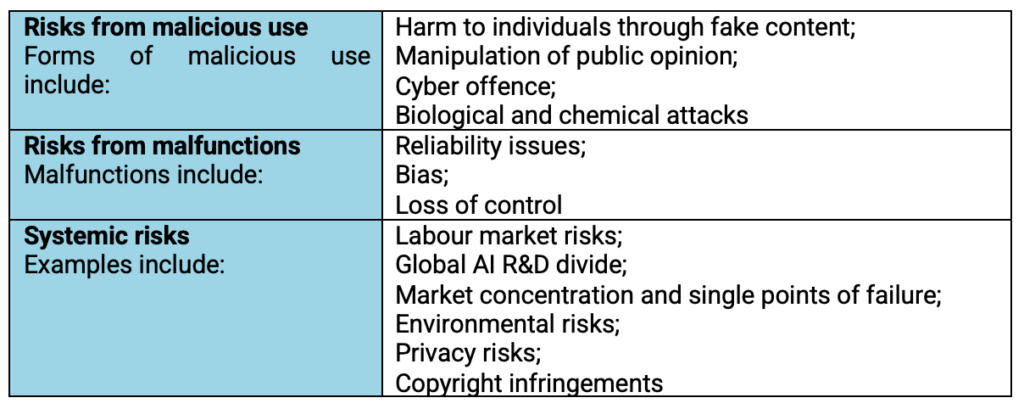Spotlight
Due to technical issues, the Friday blog remained in the cue and was not sent out. Here it is!
Happy Friday!
There were a few notable AI-related releases since my last blog, but the main one was most probably the International Scientific Report on the Safety of Advanced AI that was released earlier this week (you might recall that I had previously shared here the interim report, which was published in May 2024). Chaired by UdeM’s professor Yoshua Bengio, this 230-something-page report is the result of contributions from an Expert Advisory Panel with representations from 30 countries, the UN, the EU and the OECD, an extensive writing group, and civil society and industry reviewers.
As stated at the beginning of the report, it aims “to provide scientific information that will support informed policymaking. It does not recommend specific policies.”
It goes over current capabilities and capabilities in coming years, risks (from malicious use, from malfunctions, and at the systemic level), as well as technical approaches to risk management.
I find that the biggest value-add for post-secondary institutions is probably Section 2 – Risks. Most institutions that I have seen that have developed their own resources, guidelines or policies about AI (mostly GenAI, here) use have included their own sections on associated risks. While there are of course a lot of similarities between what institutions included in there and how they defined these risks, I find that this report provides a credible source of information to review and potentially complete those institutional guidelines.
It’s worth taking a read at Section 2 as a whole, but here’s a quick overview of what the three main types of risks covered include:

Multiple institutions are also currently developing their own training and professional development opportunities to build AI literacy and fluency within their communities. This report provides solid evidence with respect to currently agreed-upon risks, and could help inform the development of learning materials for such courses.
What other resources is your institution using to guide the development of training and literacy building activities? I’d love to add them to the repository – send them my way!
– Sandrine Desforges, Research Associate
Additional Resources
Transformation of education
Leading Through Disruption: Higher Education Leaders Assess AI’s Impacts on Teaching and Learning
Rainie, L. and Watson, E. AAC&U and Elon University.
Report from a survey of 337 college and university leaders that provides a status report on the fast-moving changes taking place on US campuses. Key data takeaways include the fact faculty use of AI tools trails significantly behind student use, more than a third of leaders surveyed perceive their institution to be below average or behind others in using GenAI tools, 59% say that cheating has increased on their campus since GenAI tools have become widely available, and 45% think the impact of GenAI on their institutions in the next five years will be more positive than negative.
Four objectives to guide artificial intelligence’s impact on higher education
Aldridge, S. Times Higher Education. January 27th, 2025
The four objectives are: 1) ensure that curricula prepare students to use AI in their careers and to add human skills value to help them success in parallel of expanded use of AI; 2) employ AI-based capacities to enhance the effectiveness and value of the education delivered; 3) leverage AI to address specific pedagogical and administrative challenges; and 4) address pitfalls and shortcomings of using AI in higher ed, and develop mechanisms to anticipate and respond to emerging challenges.
Global perspectives
DeepSeek harnesses links with Chinese universities in talent war
Packer, H. Times Higher Education. January 31st, 2025
The success of artificial intelligence platform DeepSeek, which was developed by a relatively young team including graduates and current students from leading Chinese universities, could encourage more students to pursue opportunities at home amid a global race for talent, experts have predicted.
Teaching and learning
Trends in AI for student assessment – A roller coaster ride
MacGregor, K. University World News. January 25th, 2025
Insights from (and recording of) the University World News webinar “Trends in AI for student assessment”, held on January 21st. 6% of audience members said that they did not face significant challenges in using GenAI for assessment, 53% identified “verifying the accuracy and validity of AI-generated results” as a challenge, 49% said they lacked training or expertise in using GenAI tools, 45% identified “difficulty integrating AI tools within current assessment systems”, 41% were challenged in addressing ethical concerns, 30% found “ensuring fairness and reducing bias in AI-based assessments” challenging, 25% identified “protecting student data privacy and security” as a challenge, and 19% said “resistance to adopting AI-driven assessment” was challenging.
Open access
Charting a course for open education resources in an AI era
Wang, T. and Mishra, S. University World News. January 24th, 2025
The digital transformation of higher education has positioned open educational resources (OER) as essential digital public goods for the global knowledge commons. As emerging technologies, particularly artificial intelligence (AI), reshape how educational content is created, adapted and distributed, the OER movement faces both unprecedented opportunities and significant challenges in fulfilling its mission of democratising knowledge access.
The Dubai Declaration on OER, released after the 3rd UNESCO World OER Congress held in November 2024, addresses pressing questions about AI’s role in open education.
More Information
Want more? Consult HESA’s Observatory on AI Policies in Canadian Post-Secondary Education.
This email was forwarded to you by a colleague? Make sure to subscribe to our AI-focused newsletter so you don’t miss the next ones.

 Tweet this post
Tweet this post
